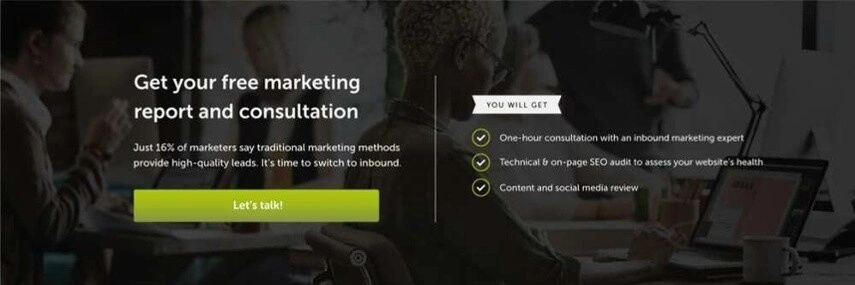What is E-A-T and Why Should Your Website Use It?

Everyone loves to eat, right? Today, we’re going to discuss a different form of eating that might not tickle your tastebuds, but it can do more than tease and tempt your audience online. That topic is the E-A-T content SEO concept. We’ll discuss what it is and why you should unleash it on your website in a moment. But first, let’s start with a quick check-in about something that all businesses are discussing right now.
How are your business decisions shifting in response to changes in the economy?
If you’re starting to scale back on some expenditures or are rethinking your products, services, and prices, you aren’t alone. Small changes and even some big potential pivots are necessary when the economy becomes more challenging. What isn’t necessary or advisable, though, is significantly scaling back on paid advertising or content marketing.
Why? Well, when consumers start to tighten up spending, businesses can succeed by focusing more on building relationships than hard selling. Search engine optimisation (SEO) grows slowly over time and requires consistency – and slowing the process of content development can have a devastating impact on positioning in search results in a very short period.
That can make a sales slump driven by the economy even more severe as you receive less targeted traffic to your website and social media channels at the same time. When you scale back on fresh, engaging content, you also give up opportunities to connect with members of your target market.
Relationship building is critical to sales in a difficult economy, so you need as many connection opportunities as possible. One way to nourish your SEO to boost search engine positioning while connecting with your audience in a meaningful way is to implement E-A-T into your content SEO strategy.
What is E-A-T for content SEO?
When Google published its Search Quality Evaluator Guidelines online, it grabbed the attention of marketers around the world. While the official word from Google is that feedback from human evaluators has no direct impact on where individual websites fall in SEO rankings, the guide does give valuable insight into what Google is looking for when evaluating the quality of a site.
Human evaluators are trained to look at specific details of websites and determine their quality and other characteristics based on one detailed guide, the Evaluator Guidelines. Section 3.2 of the guide discusses the concept of E-A-T as a way for evaluators to determine if the person, organisation, or agency behind a website has appropriate credentials for the content they’re sharing.
For example, people or organisations with medical accreditation or expertise are the most qualified producers of content that shares medical advice, and scientists are the best producers of scientific content. The guide does state that personal life experience can qualify as adequate expertise for some content, so you don’t need a degree or certifications to score highly in E-A-T, as we’ll discuss in a moment.
So, what does E-A-T stand for, and what are these qualities that Google considers adequate credentials for the content you may share when marketing your business? E-A-T stands for Expertise, Authoritativeness, and Trustworthiness. Let’s look at each of those qualities individually for a deeper understanding.
Expertise
The E in E-A-T is focused on the person(s) creating content for your website. Perhaps you have many industry experts on your team or you consult with top-level consultants to ensure your products and services are safe and highly competitive. If those aren’t the people presenting the content on your website, they may not give you a pass in the E-A-T department.
Look at the content on your website and ask one important question:
If I came across this content as a reader, who would I believe is writing or sharing the information? What qualifies them to offer this advice or deliver this information?
There are a few ways you can prove the expertise of someone sharing content on your website:
- Job titles
- Educational degrees
- Certifications
- Years of direct experience in the field
- Personal experience
You want search engines and real people to know that you’re offering accurate, insightful information that they can trust. The more the ideas presented can impact the health, safety, or wellness of readers, the more important expertise becomes.
For subjects with less risk of harming others or steering readers in the wrong direction, personal experience is adequate for this portion of the E-A-T content SEO equation. What experiences have you or your content creators had that qualify them to discuss the topics you’re presenting? How can you make that personal experience clear on your website without distracting from the content itself?
Authoritativeness
Moving beyond credentials, the A in the E-A-T equation is focused on the website and possibly the brand or business presenting the site. Authoritativeness refers to the reputation and trustworthiness of the overall company and presentation.
Look objectively at your website and ask a series of questions:
If I came across this website through a search engine, would I trust the business or organisation as a reliable source of information? Would I buy products from this website in complete confidence? Why, or why not?
To make that determination, you can research your website the same way that consumers research businesses and products before making a purchase. What are consumers and industry reviewers saying about the company or website on other sites? What is the history of the brand or business? Are other established and authoritative websites discussing or linking to this website?
Businesses with unique products and services that have established themselves in their fields have a relatively easy time passing the authoritative test for E-A-T content SEO. The website is the ultimate authority because it is the original and potentially the only source of the information provided.
Some types of websites present more of a challenge when it comes to authoritativeness. For instance, a review site established for affiliate marketing isn’t the most authoritative source for the products sold through the site. They’re promoting someone else’s goods and services, so they need to establish authoritativeness through other reputation-building strategies.
Trustworthiness
The T in the E-A-T equation is based on how worthy the website is of consumer trust. There are some questions you can ask to evaluate your own site for trustworthiness just as you did for the other two qualities:
Is the content presented relevant and accurate? Does the content offer in-depth information that is valuable and respectable? Are the names of real content creators presented, providing transparency on the source of all information?
Some common signs of a trustworthy site, according to Google’s E-A-T strategy, include:
- Contact information listed on the website
- Secure payment processing system
- Factual content with verifiable information
- Links to reputable primary sources
- Transparency regarding affiliate links
Trustworthiness is a more difficult concept to prove because it’s subjective. What one person might question on a website is often overlooked by many others. Doing your best to ensure your website appears worthy of trust and respect can go a long way to impressing human readers, so it’s worth the effort if you want to maximise results from your digital marketing efforts.
Is E-A-T really important for your website?
The answer to this question depends on what products and services you’re marketing. Google does evaluate websites of all varieties with these standards of expertise, but some topics clearly require far more authoritativeness than others.
For instance, a website that presents light-hearted memes and funny clips of animals doesn’t require much expertise. Jokes are universal and subjective, so personal opinion and selection is likely safe as long as there are no other red flags discovered.
Compare that to a website filled with medical and lifestyle advice for pregnant women and breastfeeding mothers. You’re now stepping into territory that can have a significant impact on the health, well-being, and happiness of your audience. More expertise and authority are expected for that content to rank as trustworthy.
Regardless of what you’re promoting, it’s best to present a strong case for the expertise, authoritativeness, and trustworthiness of your business or even yourself and individual authors named in your content bylines. Even if it doesn’t impact your SEO rankings directly, it doesn’t hurt to back your content with trust and respect.
After all, what are your website visitors, customers, patients, or clients really looking for when they visit your website? They also want to know that you’re trustworthy, right? E-A-T may also help improve conversion rates as your readers see signs that you’re the expert they can trust.
How is your digital marketing plan doing today?
It’s important to check up on your marketing plan regularly. As SEO best practices and consumer expectations shift, you want to make sure your brand remains competitive. From the content on your website to your social media presence and paid online ads, there are a lot of pieces to your online platform.
Those pieces should thrive individually while supporting one another as a cohesive digital marketing unit. It’s all about building a strong brand voice and connecting with your target audience consistently.
If it’s been a while since you’ve had a thorough marketing check-up or you know it isn’t living up to its full potential, as inbound marketing experts, Angelfish can help. Request your free inbound marketing consultation today for a complimentary analysis of your website, social media, ads, and more.

Ready to Unlock AI SEO for Your Business?
AI SEO isn’t coming — it’s already here. Capture high-intent traffic and build sustainable pipeline growth.
Get Your Free Audit

